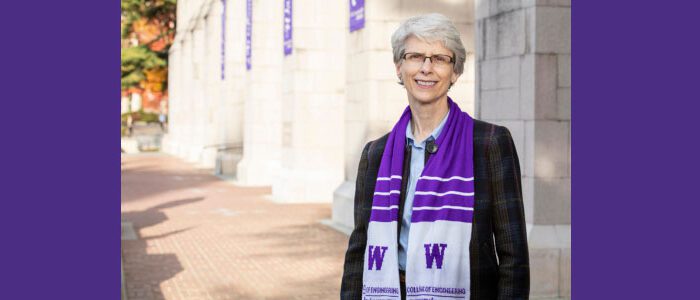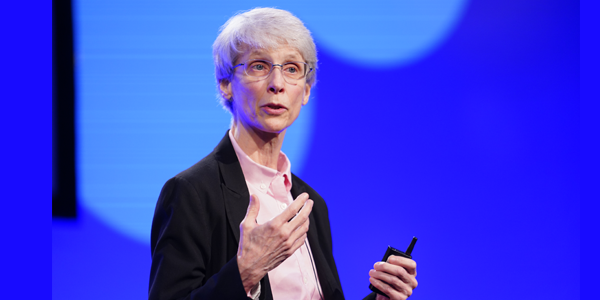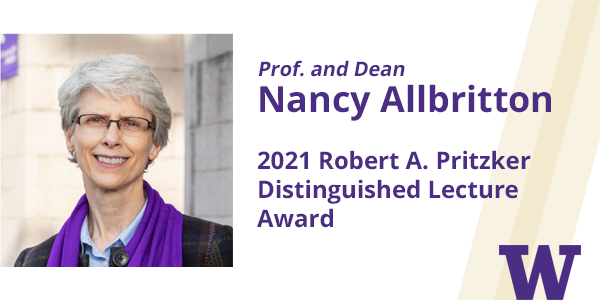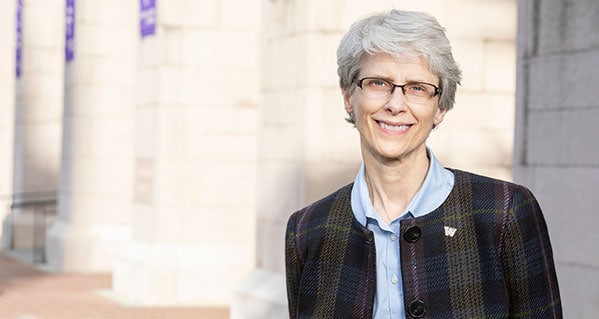Frank & Julie Jungers Dean
College of Engineering
Professor of Bioengineering
nlallbr@uw.edu
Phone: (206) 543-1829
Office: 371 Loew Hall
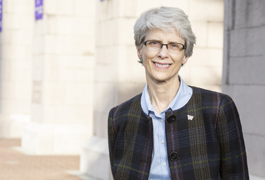
Nancy Allbritton
Research in my laboratory focuses on the development of novel methods to answer fundamental questions in biology & medicine. Much of biology & medicine is technology limited in that leaps in knowledge follow closely on the heels of new discoveries and inventions in the physical and engineering sciences; consequently, interdisciplinary groups which bridge these different disciplines are playing increasingly important roles in biomedical research. My lab has developed partnerships with other investigators in the areas of biology, medicine, chemistry, physics, and engineering to design, fabricate, test, and utilize new tools for biomedical and clinical research. Collaborative projects include novel strategies to measure enzyme activity in single cells by capillary and microfluidic electrophoresis, new strategies for software identification of cellular attributes by microscopy, organ-on-a-chip technologies, array-based methods for cell screening, and biodegradable scaffolding for regenerative medicine. An additional focus area is the development of software and instrumentation to support these applications areas. I have >20 issued patents and >25 pending patents which have led to 15 commercial products. Four companies have been formed based on my research discoveries: Protein Simple (acquired by Bio-Techne in 2014 for over $0.3 billion), Intellego, Cell Microsystems (cellmicrosystems.com), and Altis Biosystems (www.altisbiosystems.com). Cell Microsystems currently has world-wide distribution of its unique cell sorting platform through an agreement with the biotechnology company Qiagen and Altis Biosystems has >7 ongoing confidential partnerships with pharma/biotech companies. These accomplishments demonstrate my ability to design and build novel technologies and then translate these technologies into the marketplace to insure their availability to the biomedical research community.
- Analytical techniques for single-cell biochemical assays,
- Microfabricated platforms for high-throughput cytometry and isolation of cells for genetic analyses and cloning, and
- Microengineered systems for recapitulating organ level function.
Many of the lab’s projects and extensive collaborations within these focus areas involve the development and application of new technologies for oncology, gastrointestinal diseases, and stem cell research.
1987 Ph.D. Medical Physics/Medical Engineering, Health Sciences and Technology, Massachusetts
Institute of Technology, Cambridge, MA
1985 M.D. Medicine, Johns Hopkins University School of Medicine, Baltimore, MD
1979 B.S. Physics, Louisiana State University, Baton Rouge, LA
1989-1994 Postdoctoral Fellow with Dr. Lubert Stryer, Dept. of Cell Biology, Stanford University
1994-2007 Professor, University of California at Irvine, Depts of Physiology and Biophysics, Biomedical
Engineering, Chemistry, Chemical Engineering and Materials Science
2007-2019 Kenan Professor, University of North Carolina at Chapel Hill and North Carolina State University, Depts of Biomedical Engineering, Chemistry, Pharmacology, Materials Science and Engineering, Applied Physical Sciences, Molecular Pharmaceutics
- 2024 Elected to the National Academy of Engineering
- 2022 – 2025 Advisory Board Member, Berthiaume Institute for Precision Health, University of Notre Dame, Notre Dame, IN
- 2021 BMES Robert A. Pritzker Distinguished Lecture Award
- 2021 Review Panel for the Swiss National Science Foundation, National Centres of Excellence (NCCRs), NCCR AntiResist.
- 2021 – 2024 External Advisory Committee, School of Biomedical Engineering, University of British Columbia, Vancouver, Canada
- 2020 Elected to the Washington State Academy of Sciences
- 2020 – 2025 Co-editor, Annual Review of Analytical Chemistry
- 2020 National Academies of Sciences, Engineering, and Medicine’s Panel on Review of the Material Measurement Laboratory at the National Institute of Standards and Technology
- 2020 – 2024 Member, Physical and Computational Sciences Directorate Advisory Committee, Pacific Northwest National Laboratory
- 2020 Ralph Adams Award in Bioanalytical Chemistry
- 2019 Hector Lopez Memorial Lecture, National Advisory Council for Biomedical Imaging and Bioengineering
- 2019 – 2021 Advisory Board, Center for Subcellular Genomics, University of Pennsylvania, Philadelphia, PA
- 2019 – 2021 External Advisory Board, Dept. of Biomedical Engineering, University of Florida, Gainesville, FL
- 2018 Distinguished Lecturer, North Carolina Section of the American Chemical Society
- 2018 – 2021 Beckman Foundation Scientific Advisory Board
- 2017 Edward Kidder Graham Award for Leadership and Service to UNC and the State of North Carolina
- 2017 – 2020 Elected as a member of the Electorate Nominating Committee (ENC) of the Section on Medical Sciences in AAAS
- 2017 – 2020 Advisory Board, Coulter Dept. of Biomedical Engineering at Georgia Tech and Emory University
- 2017 UNC “Inventor of the Year” Award
- 2016 – 2021 Editorial Board, Annual Reviews in Analytical Chemistry
- 2016 – 2021 External Advisory Board, Dept. of Bioengineering, Imperial College, London
- 2016 Charles M. Knight Lecturer at The University of Akron
- 2016 ACS Division of Analytical Chemistry, Award in in Chemical Instrumentation
- 2015 Elected as a Fellow, AAAS
- 2015 IEEE Life Sciences Leadership Award (NC Division)
- 2015 Elected as a Fellow, National Academy of Inventors
- 2013 – 2016 Member, Scientific Advisory Committee, Beckman Foundation
- 2012 – 2014 Analytical Chemistry Editorial Advisory Board
- 2010 – 2013 National Councilor Member, Biophysical Society
- 2010 Elected as a Fellow, American Institute for Medical & Biological Engineering
- 2009 Mary K. and Velmer A. Fassel Award, Dept. of Chemistry, Iowa State University
- 2004 UCI College of Medicine Excellence in Teaching Award
- 2003 UCI Midcareer Research Award
- 1995 Searle Scholar Award
- 1995 Beckman Young Investigator Award
Undergraduate and Graduate Research
- Wang, A.S., Villegas-Novoa, C., Wang, Y., Sims, C.E., Allbritton, N.L. 2024. Mucus-coated, magnetically-propelled fecal surrogate to mimic fecal shear forces on colonic epithelium. Biomaterials. In press.
- Kim, R., Allbritton, N.L. A Microphysiological System with an Anaerobic Air-Liquid Interface and Functional Mucus Layer for Coculture of Intestinal Bacteria and Primary Human Colonic Epithelium. 2024. Advanced Materials Interfaces. In press.
- Wang, H., Kim, R., Wang, Y., Furtado, K.L., Sims1, C.E., Tamayo, R., Allbritton, N.L. 2024. In vitro co-culture of C. scindens with primary human colonic epithelium protects the epithelium against S. aureus. Frontiers in Bioengineering. In press.
- Cortés-Llanos, B., Jain, V., Cooper-Volkheimer, A., Browne, E.P., Murdoch, D.M., Allbritton, N.L., 2023. Automated microarray platform for single-cell sorting and collection of lymphocytes following HIV reactivation. Bioeng. Transl. Med. 8:e10551.
- Yao, M., Vaithiyanathan, M., Allbritton, N.L. Analytical Techniques for Single-Cell Biochemical Assays of Lipids. 2023. Annual Review Biomed. Eng. 25:281-309.
- LaBelle, C.A., Zhang, R.J., Hunsucker, S.A., Armistead, P.M, Allbritton, N.L. 2023. Microraft Array Platform and Pipeline for Analysis of Serial-Killer CD19 Chimeric Antigen Receptor T Cells and Single Cell Isolation. Cytometry A.103:208-220.
- Wang, Y., Yao. M., Sims, C.E., Allbritton, N.L. Monolithic Silica Microbands Enable Thin Layer Chromatography Analysis of Single Cells. 2022. Anal Chem.2022, 94:13489–13497
- DiSalvo, M., Cortés-Llanos, B., LaBelle, C.A., Murdoch, D.A., Allbritton, N.L. 2022. Scalable additive construction of arrayed microstructures with encoded properties for bioimaging. Micromachines. 13:1392.
- Villegas-Novoa, C., Wang, Y., Sims, C.E., Kim, R., Allbritton, N.L. 2022. Development of a Primary Human Intestinal Epithelium Enriched in L-cells For Assay of GLP-1 Secretion. Anal. Chem. 94:9648–9655.
- Wang, Y., Sims, C.E., Allbritton, N.L. 2022. Human 2D Crypt Model for Assaying Intestinal Stem Cell Proliferation and Differentiation. Anal. Chem. 94:9345-9354.
In the News
Nancy Allbritton elected to the National Academy of Engineering
2024-02-23T09:09:00-08:00February 7th, 2024|
Nancy Allbritton receives 2021 Pritzker Distinguished Lecture Award
2021-10-21T14:24:33-07:00October 14th, 2021|
Nancy Allbritton to Receive 2021 Pritzker Distinguished Lecture Award
2021-10-06T21:42:56-07:00May 13th, 2021|
Bioengineer Nancy Allbritton Named Dean of UW College of Engineering
2021-02-26T10:42:08-08:00December 30th, 2019|



